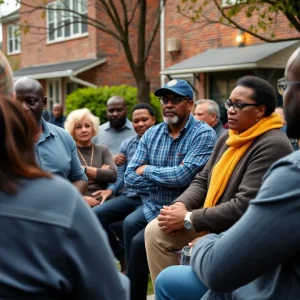News Summary
In response to a neo-Nazi march in July, Nashville has launched the PEACE Act, a new legislation aimed at tackling hate groups. The act empowers law enforcement, introduces penalties for hate speech and transportation of individuals in box trucks, and establishes buffer zones to protect citizens. Local leaders, including Mayor Freddie O’Connell, support the comprehensive approach to enhance community safety and inclusivity, despite concerns over potential First Amendment violations. The city aims to foster a welcoming environment for all residents.
New Legislation in Nashville Aims to Tackle Hate Groups
In a vibrant city known for its music and hospitality, Nashville is taking a strong stance against hate. A recently introduced bill, dubbed the Protecting Everyone Against Crime and Extremism Act (PEACE Act), seeks to combat the disturbing presence of hate groups, especially after a notable neo-Nazi march that rocked downtown Nashville in July.
Background on the Neo-Nazi March
During that troubling event, a group known as the Goyim Defense League marched through downtown, loudly proclaiming antisemitic slogans that shocked tourists and residents alike. This incident did not go unnoticed by Tennessee lawmakers, who recognized the urgent need for action to ensure the safety and well-being of the community.
The PEACE Act: A Comprehensive Approach
Spearheaded by House Majority Leader William Lamberth and Senator Mark Pody, the PEACE Act is designed to empower law enforcement while also safeguarding the citizens of Nashville. The legislation focuses on deterring hate crimes, equipping police with enhanced authority to charge individuals who are found violating this new law. Importantly, it addresses specific tactics used by hate groups, such as the transportation of individuals in box trucks, which were utilized during the aforementioned marches.
Key Features of the Bill
The PEACE Act introduces several significant changes to existing state laws. For instance, it makes it illegal to transport individuals in box trucks, turning this practice into a Class B misdemeanor. This move aims to cut down on the provocative methods that hate groups use to spread their message. Furthermore, the bill revamps laws concerning littering, trespassing, police procedures, and road safety, creating a more comprehensive legal framework to combat hate-related incidents.
Addressing Hate Speech and Intimidation
One of the most critical aspects of the PEACE Act is its focus on hate speech. The legislation now makes it a Class A misdemeanor to distribute literature deemed as hate speech or to intimidate someone exercising their civil rights. This legislative move underscores Nashville’s commitment to protecting its residents from harassment, while also sparking discussions about the potential limitations of free speech under the First Amendment.
Buffer Zones and Identification Regulations
In a bid to enhance safety, the bill establishes a buffer zone of 25 feet between police officers and individuals who are ordered to stop, making it a Class B misdemeanor to breach this space. Additionally, if someone refuses to identify themselves to an officer or provides false identification, they could face a Class C misdemeanor charge. These measures are clearly aimed at improving the relationship between law enforcement and the community during tense situations.
The Bigger Picture
The Metro Nashville Council previously reinforced the message that hate will not be tolerated by passing an ordinance targeting hate groups. Support for the PEACE Act is widespread among local leaders, including Nashville’s Mayor Freddie O’Connell, who appreciates the expanded tools for law enforcement to combat hate effectively.
Future Implications and Concerns
Despite the optimism surrounding the bill, there are concerns from First Amendment experts about its constitutionality. Almost all forms of hate speech are protected under the First Amendment, and experts predict that the legislation could be scrutinized or challenged based on past rulings that upheld free speech rights.
A Positive Trend in Bias-Motivated Incidents
Interestingly, the Tennessee Bureau of Investigation reported a slight decline in bias-motivated incidents, from 129 in 2022 to 122 in 2023. This suggests that concerted efforts may be having an effect, but there’s no doubt that much work remains to protect the community fully.
Nashville Takes a Stand
As Nashville continues to ramp up its response to hate groups, the PEACE Act stands as a beacon of hope. It represents a collective effort of lawmakers, community leaders, and residents alike to ensure that our city remains a welcoming space for everyone. With new signage ordinances and restrictions on flyer distribution, Nashville is clearly taking the initiative to foster safety and inclusivity in every corner.
Deeper Dive: News & Info About This Topic
HERE Resources
Nashville Man Faces Charges After Library Vandalism
Celebrate Martin Luther King Jr. Week in Nashville
Biden Meets with Venezuelan Opposition Leader Edmundo González
East Nashville Sees Spike in Car Break-Ins: Four Teens Arrested
North Korea Launches Missile Amid South Korean Political Turmoil
Jimmy Carter’s Lasting Impact on Africa’s Future
Nation Honors Jimmy Carter as Funeral Procession Begins
Nashville Employees Raise Alarm Over Safety Amid Violence
New Bill Aims to Tackle Hate Crimes in Tennessee
Tragic New Year’s Eve Fireworks Explosion Claims Lives in Honolulu
Additional Resources
- Tennessee Lookout: Tennessee Republicans, Nashville Mayor Back Antisemitism Bill
- Wikipedia: Hate Speech
- Axios: Tennessee Republicans File Bills to Deter Acts of Hate
- Google Search: Nashville Anti-Hate Legislation
- ABC News: Man Arrested for Alleged Neo-Nazi Inspired Plot
- Google Scholar: Hate Crime Legislation
- NewsChannel 5: Tennessee Lawmakers File Bill to Confront Hate
- Encyclopedia Britannica: Hate Crime
- The New York Times: Opinion on White Supremacist Activity in Nashville








